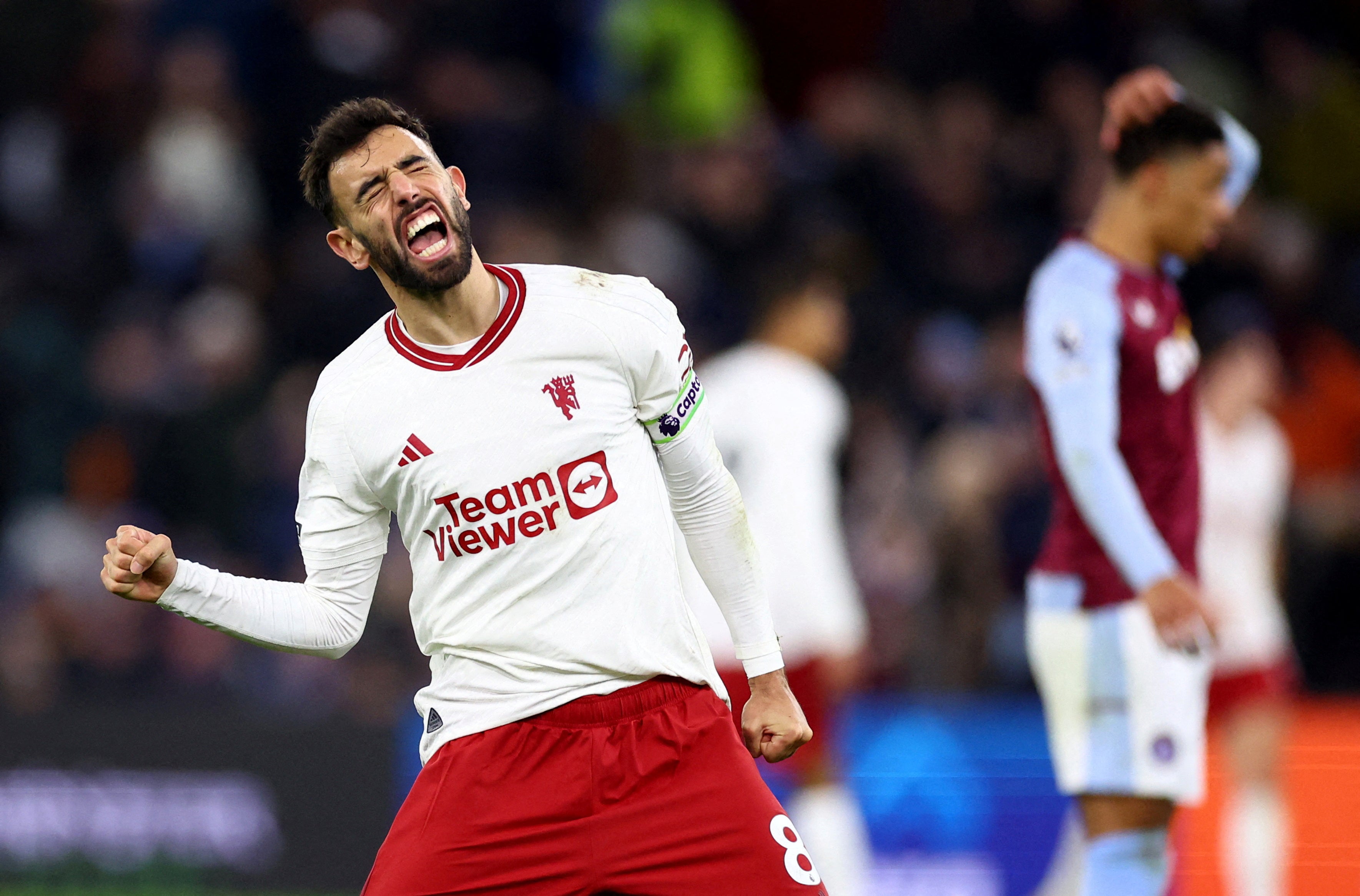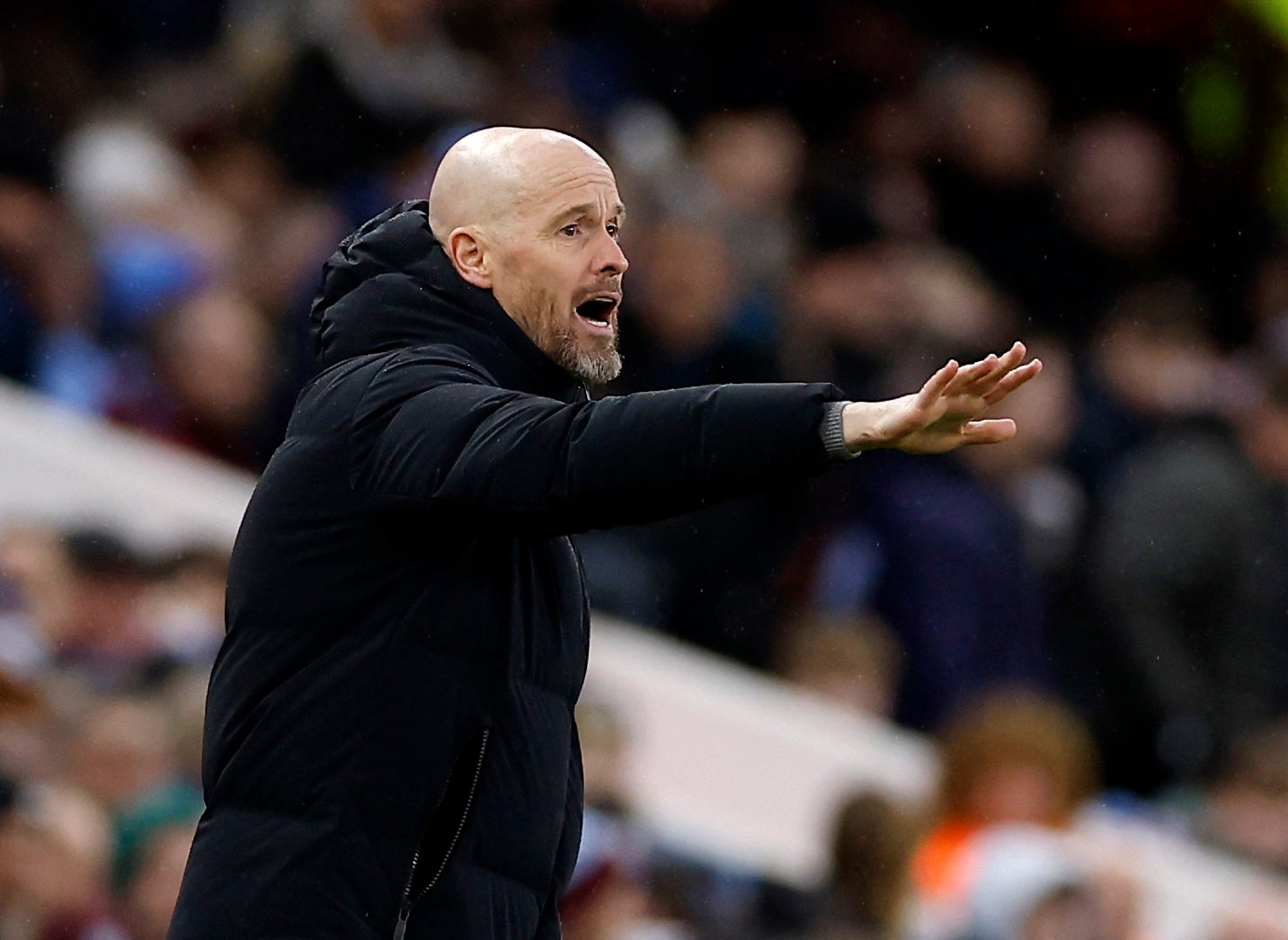Has Erik ten Hag finally found the solution to Manchester United’s away form?
Ten Hag’s side ended a miserable 18-month run with victory at Villa Park, but was it a one-off or the sign of something sustainable?

Your support helps us to tell the story
From reproductive rights to climate change to Big Tech, The Independent is on the ground when the story is developing. Whether it's investigating the financials of Elon Musk's pro-Trump PAC or producing our latest documentary, 'The A Word', which shines a light on the American women fighting for reproductive rights, we know how important it is to parse out the facts from the messaging.
At such a critical moment in US history, we need reporters on the ground. Your donation allows us to keep sending journalists to speak to both sides of the story.
The Independent is trusted by Americans across the entire political spectrum. And unlike many other quality news outlets, we choose not to lock Americans out of our reporting and analysis with paywalls. We believe quality journalism should be available to everyone, paid for by those who can afford it.
Your support makes all the difference.Assess Erik ten Hag’s reign as Manchester United manager, as his new paymasters are now doing, and the standout moment came at Wembley when he lifted the Carabao Cup trophy. But most of the defining triumphs, the reasons to believe the Dutchman is the right man, were at Old Trafford.
Liverpool, Arsenal, Tottenham, Manchester City, Barcelona, Aston Villa, Chelsea: Ten Hag amassed an impressive collection of scalps. But only on home soil. When, more than 18 months after Ten Hag’s debut in the dugout, Scott McTominay added to his assortment of vital goals by heading United to victory at Villa Park, it was more than just one result. Partly because, had United lost a game in which Unai Emery believed his side played as well as in their storming win over Manchester City, they would have been 11 points behind Villa, in effect out of the race for the Champions League spots.
But also because it was arguably United’s first win on the road against anyone remotely resembling elite opposition since Ole Gunnar Solskjaer’s last stand, since October 2021’s triumph at Tottenham. The mention of the manager shows it was another era: the first two scorers were Cristiano Ronaldo and Edinson Cavani, who now have a combined age of 75. If Ten Hag cannot be blamed for some of United’s depressing away days in the following seven months, United’s record in the toughest tests on the road since then felt an indictment; one that Sir Jim Ratcliffe, Sir Dave Brailsford and the incoming CEO Omar Berrada may examine.
“I think we can beat any opponent away or at home,” Ten Hag said, after a long wait was ended with a stirring win. Yet this season, with the exceptions of West Ham and Villa themselves, United had struggled to beat the better sides at home. Over two campaigns, they had never defeated them away from home. They had two points from 13 meaningful matches: against the other teams who finished in the top nine last season and then those currently in the top nine.

It started with the harrowing humbling at Brentford in Ten Hag’s second game; a turning point in other respects set the tone for his terrible travellers. Last season, 28 goals were conceded in eight such matches (and only 15 in their other 30 Premier League encounters); scorelines of 4-0, 6-3, 3-1, 3-2, 7-0, 2-0, 2-2 and 1-0 had a grimness. This season, United have a 0-0 draw at Anfield and an improved defensive record on such stages, but 2-0, 3-1, 1-0 and 2-0 defeats. They arrived at Villa Park with one goal in the five marquee away games. They scored twice. It ranked as one of the best results of Ten Hag’s reign.
He argued that the win at Villa was coming, that there could have been more. “Sometimes away we have to believe it more,” he said. “We could have won in Arsenal; we deserved to win there. We could have won in Liverpool. It is about belief and this team today believed we could win.”
But was it a sustainable formula or a one-off? A difference at Villa came in part from an in-form forward, in Rasmus Hojlund; only Marcus Rashford was prolific last season, and he scored in just two of those eight matches, so outgunning their opponents could be their best strategy. United can lack the solidity to win such games 1-0. They invariably have a minority share of the ball: apart from a 66 percent share against West Ham’s anti-possession team, United have not topped 45 percent away at a top-nine team this season. They had 44 percent at Villa. They could not take the sting out of it. “Like a tennis match,” was Ten Hag’s description of the drama. United required perhaps the best display of Andre Onana’s troubled time at the club.

They won the match and lost the numbers game. Villa had 23 shots and an xG of 2.65. It continued a theme: over the six away games at Arsenal, Tottenham, Newcastle, Liverpool, West Ham and Villa this season, their opponents have averaged 21 shots and an expected goals of 2.25.
Which, as they conceded 11 goals in three away Champions League games and three more in April’s Europa League elimination in Seville, felt familiar. In the top-nine away games last season, United’s opponents averaged 18 shots and an xG of 2.39.
United can play games of transitions, looking for counter-attacks. Ten Hag lamented an overly attacking attitude at Villa. “We went in every situation for goal instead of keeping the ball,” he said. “We always want to control the game and dictate the game and that should be our approach.” Yet few teams play with less control than United. It made for a thriller at Villa; if their spirit suggested more such wins are possible, they have more to prove to justify Ten Hag’s belief they can beat any opponent away from home.
But his finest team could. His Ajax side won away at Juventus, Real Madrid and Ajax in 2018-19. They were the kind of results that helped propel him to Old Trafford. But away from Old Trafford he has had such results too infrequently since then.
Join our commenting forum
Join thought-provoking conversations, follow other Independent readers and see their replies
Comments